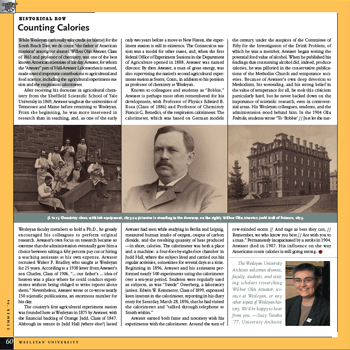HISTORICAL ROW: COUNTING CALORIES
 While Wesleyan can’t really take credit (or blame) for the South Beach Diet, we do count “the father of American nutrition” among our alumni. Wilbur Olin Atwater, Class of 1865 and professor of chemistry, was one of the best known American scientists of his day. Atwater, for whom the “Atwater” part of Hall-Atwater Laboratories is named, made several important contributions to agricultural and food science, including the agricultural experiment station and the respiration calorimeter.
While Wesleyan can’t really take credit (or blame) for the South Beach Diet, we do count “the father of American nutrition” among our alumni. Wilbur Olin Atwater, Class of 1865 and professor of chemistry, was one of the best known American scientists of his day. Atwater, for whom the “Atwater” part of Hall-Atwater Laboratories is named, made several important contributions to agricultural and food science, including the agricultural experiment station and the respiration calorimeter.
After receiving his doctorate in agricultural chemistry from the Sheffield Scientific School of Yale University in 1869, Atwater taught at the universities of Tennessee and Maine before returning to Wesleyan. From the beginning, he was more interested in research than in teaching, and, as one of the early Wesleyan faculty members to hold a Ph.D., he greatly encouraged his colleagues to perform original research. Atwater’s own focus on research became so extreme that the administration eventually gave him a choice between taking a fifty percent pay cut or hiring a teaching assistant at his own expense. Atwater recruited Walter P. Bradley, who taught at Wesleyan for 25 years. According to a 1938 letter from Atwater’s son Charles, Class of 1906, “… our father’s … idea of heaven was a place where he could conduct experiments without being obliged to write reports about them.” Nevertheless, Atwater wrote or co-wrote nearly 150 scientific publications, an enormous number for his day.
The country’s first agricultural experiment station was founded here at Wesleyan in 1875 by Atwater, with the financial backing of Orange Judd, Class of 1847. Although its tenure in Judd Hall (where else?) lasted only two years before a move to New Haven, the experiment station is still in existence. The Connecticut station was a model for other states, and, when the first federal Office of Experiment Stations in the Department of Agriculture opened in 1888, Atwater was named director. By then Atwater, a man of great energy, was also supervising the nation’s second agricultural experiment station at Storrs, Conn., in addition to his position as professor of chemistry at Wesleyan.
Known to colleagues and students as “Bobbie,” Atwater is perhaps most often remembered for his development, with Professor of Physics Edward B. Rosa (Class of 1886) and Professor of Chemistry Francis G. Benedict, of the respiration calorimeter. The calorimeter, which was based on German models Atwater had seen while studying in Berlin and Leipzig, measured human intake of oxygen, output of carbon dioxide, and the resulting quantity of heat produced —in short, calories. The calorimeter was both a place and a machine: a four-foot-by-eight-foot chamber in Judd Hall, where the subject lived and carried out his regular activities, sometimes for several days at a time. Beginning in 1896, Atwater and his assistants performed nearly 500 experiments using the calorimeter over a ten-year period. Students were regularly used as subjects, as was “Swede” Osterberg, a laboratory janitor. Edwin W. Kemmerer, Class of 1899, expressed keen interest in the calorimeter, reporting in his diary entry for Saturday, March 28, 1896, that he had visited the calorimeter and “talked through telephone to Smith within.”
Atwater earned both fame and notoriety with his experiments with the calorimeter. Around the turn of the century, under the auspices of the Committee of Fifty for the Investigation of the Drink Problem, of which he was a member, Atwater began testing the potential food value of alcohol. When he published his findings that consuming alcohol did, indeed, produce calories, he was pilloried in the conservative publications of the Methodist Church and temperance societies. Because of Atwater’s own deep devotion to Methodism, his teetotaling, and his strong belief in the value of temperance for all, he took this criticism particularly hard, but he never backed down on the importance of scientific research, even in controversial areas. His Wesleyan colleagues, students, and the administration stood behind him. In the 1904 Olla Podrida, students wrote “To ‘Bobbie’ // Just let the narrow-minded storm // And rage as best they can, // Remember, we who know you best // Are with you to a man.” Permanently incapacitated by a stroke in 1904, Atwater died in 1907. His influence on the way Americans count calories is still going strong.

